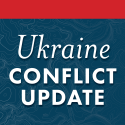Ukraine Conflict Update 17
Mar 18, 2022 - ISW Press
Russian and Ukrainian negotiators have likely agreed that Ukraine will not join NATO but disagree on Ukraine’s neutrality, disarmament, and territorial claims as of March 17. The Financial Times reported on March 15 that Russian and Ukrainian negotiators were considering a 15-point deal stipulating that Ukraine renounce its NATO ambitions and promise not to host foreign military bases or weaponry in exchange for security guarantees from states like the United States, United Kingdom, and Turkey. Ukrainian President Volodymyr Zelensky acknowledged on March 15 that Ukraine will not join NATO, citing NATO state reservations rather than Russian demands.










